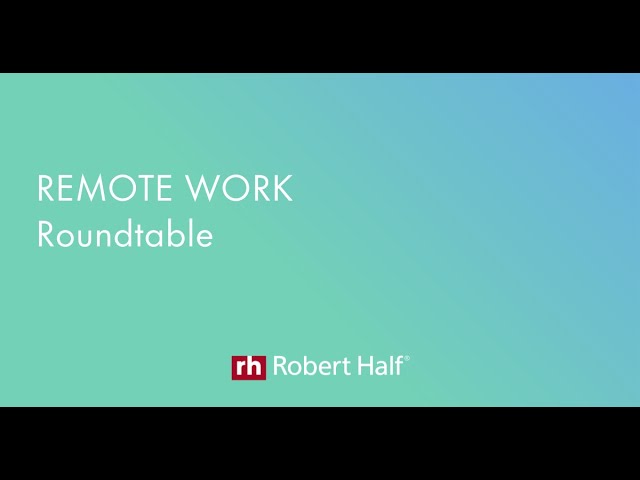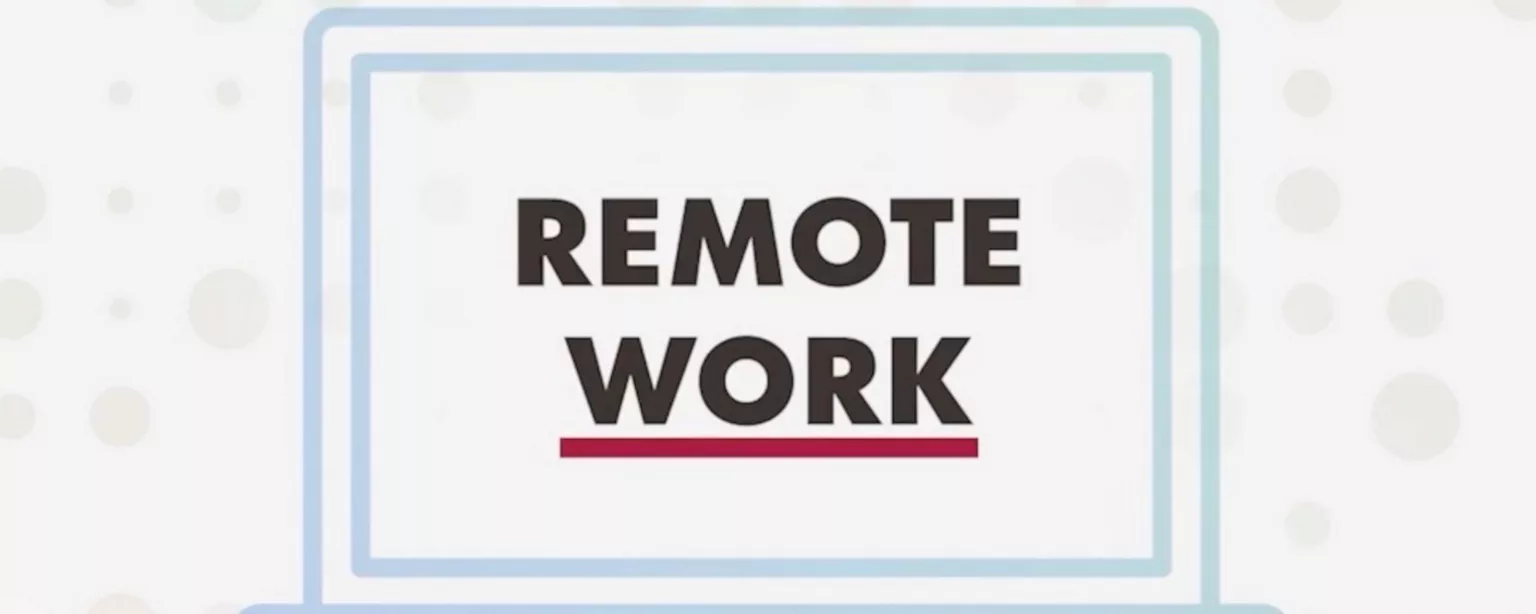Remote work is one of the hottest topics of the year for both companies and job seekers. Watch as Robert Half’s top leaders discuss the benefits of a work-from-anywhere culture — and why the future of work may still be evolving.
Robert Half Remote Work Talent Pool Roundtable

53% of professionals have the flexibility to work remotely. And those that don’t – 40% want to work remotely… but despite that demand, only 38% of employers really see facilitating that type of work environment as a top priority. Why the disconnect? And what does that mean if I’m an employer, a candidate or an employee?
Trisha Plovie, senior vice president, Global Future of Work
1:16 So there is a great divide right now between employees and what they want – and employers – and what they want as well.
1:24 So for the employers’ side, I think the important thing to work on – or to focus on – is how the work gets done, instead of when and where the work gets done.
1:32 Employers that can offer some flexibility can attract a greater pool of qualified talent to join their organization. They can look nationally versus just in their local geography; and that can help strengthen the organization as a whole.
1:46 The other thing from the employers’ side is it may limit the amount of people (if they are on-site for instance); it may limit the amount of applicants that they get to apply for jobs that they post. It may also transcend into their internal employees as well and maybe they experience turnover because their internal employee pool wants some flexibility and they want to be able to work hybrid or remotely fully.
2:14 The other piece of that is the whole pay situation as well. They may have to pay employees more to be on site or to beef up their benefits packages and their perks that they offer employees to come on site.
2:28 Now, from an employee’s standpoint I think it’s really important to recognize what’s important to you. If it’s that collaboration and being shoulder to shoulder with your colleagues and being able to communicate and socialize in person, then you should probably consider going on-site.
2:47 However, if flexibility is really what’s driving you and you want the autonomy to work either hybrid or remotely it’s important to recognize that as you begin your job search so you know exactly which organizations you want to work at and what type of positions you’re interested in.
On the flip side – employers that are open to remote work and have established (or are on their way to establishing) that mind-set; they’re telling us they’re seeing clear benefits to that approach. What are some of those benefits?
Billie Moliere, district president, Robert Half
3:22 There are a number. I can actually characterize it as a laundry list, but I’ll hit on just a few: There’s some information you’ll find in our 2022 Salary Survey that indicates based on the survey that 54% of hiring managers were able to identify more skilled talent by making sure they opened up the talent pool. Forty-eight percent (48%) indicate they were able to attract talent that met all their skills required for the job, which we know is really important in this candidate-tight market.
3:55 (On-Camera) I think a few other things we can think about is the hiring process. Thirty-four percent (34%) indicated that the process was shorter
4:03 That’s really important because there’s another survey we conducted that indicated a significant number of applicants will disengage or quote un-quote ‘ghost’ an interview process if there’s a poor or slow process. So being able to expand the breadth of scope of candidates that you’re looking to identify to shorten that process virtually obviously is helpful.
4:26 A few other things I would mention: compensation, flexibility, retention boost – and one other thing I think I would note… I think people don’t think about as much is the ability to increase your diversity, equity and inclusion experience by allowing the connectivity across the country and even some cases across the globe to talent you might be on-boarding remotely.
Creating a remote work force isn’t always easy, you can’t just flip the switch and implement a successful remote workforce – when employers and companies are adapting their tactics or recruiting tactics to support a remote workforce, what should they keep in mind?
Diane Domeyer, managing director, Managed Technology Solutions
5:25 First of all, it’s really important to broaden the geography of where you are sourcing talent. And we’ve already touched on the benefits of doing that, but it is far more than simply checking a box on a job placement or a job posting that says you’re ‘open to remote work’. Broadening your geography to recruit and source for top talent requires you to research what markets might be a talent source for your organization based on what you’re looking for – and how are you marketing your organization as an ‘employer of choice’ in that market? Being deliberate of where you’re sourcing the talent and then what are you doing from a ‘demand generation’ standpoint to make sure you’re positioned as an employer in that market. And that will change for a lot of organizations.
6:13 What we are seeing is employers that are benefiting in this marketplace are those that are taking a ‘one-size doesn’t fit all’ approach – so that would bring me to my second point.
6:22 Which is make sure you are communicating the benefits of your organization and your culture, whether that’s hybrid, remote or on-site. But tailoring that benefit to what you heard from the job seeker is most important to them. Right? Communicating the benefits of what is offered for that unique individual.
6:47 And then the third thing shifting to beyond recruiting and retention strategies – to management – the third emphasis is I would say: make sure your management culture focuses on outcome versus effort. We’ve heard many organizations that have struggled in this environment as they’ve moved back on-site, where while they may be offering some flexibility – they are viewed to be tracking the number of hours people are working or swiping badges in and out of the building and it is being perceived as a micro-management environment when in essence they are being provided some flexibility. So if the focus is on outcome and what is expected of an individual’s performance versus effort or time worked, you will fair well in the long-run.
How about the employee or job seeker? What sort of mindset should they adopt when considering a remote career path? Because we are seeing career paths that are fully remote. What is that mindset job seekers should take?;
7:54 Trisha: It’s a mindset of discipline. So it takes a lot of self-discipline to work remotely or even hybrid – to be able to just even balance the distractions that happen at home, just like distractions that happen in the office. And I think a ‘high touch’ communication point with your manager is important to update them on progress you’re making towards goals – and making sure you do have crystal clear goals you’re looking to achieve, week after week, and maybe those are even broken down into day-type compartments for you as well.
8:30 Billie: I would say you’ve got to be intentional about a couple of things: One, connecting and collaborating, two, about how you show up everyday – you know, we can see the tops of us today not the bottoms. So not so concerned about the slippers, but you want to make sure you’re representing yourself in a way that you plan to be perceived every day carrying out your responsibilities at the job.
8:53 A few other things: Problem Solver… being able to troubleshoot on your own, because there may be occasions where you just have to do that. You may not have access to what you need immediately and I think that’s a helpful competency and attribute. Being agile and flexible and then ensuring, this goes back to being intentional about the way you show up every day; make sure you’re external and internally customer and client facing.
Those things should be top of mind for remote employees
9:44 Diane: Well, we clearly know remote work isn’t for everyone – but if you think it is for you – there is one thing that you should absolutely bear in mind in my opinion – and that is a level of intentional visibility. Not only how you show up every day but specifically how are you going to give visibility to the work you are doing, to the specific objectives you have accomplished, the outcomes of your work – because there is something very true in proximity, bias or visibility bias – and so you do need to be intentional about how you are giving visibility to the work you are doing in a professional way if you want to achieve your long-term career objectives.
10:29 So thinking through, how are you going to bring intentional visibility to the work you do on a day to day and week to week basis.
When it comes to remote work, what is the one word you would use to characterize either the job market or the hiring environment?
10:53 Diane: Transformative. I think we’ve seen that happen in particular over the last couple of years as it relates to how employers attract and retain talent, but also what employees are looking for and I would expect that transformation is not over. Many of these trends were long in the works before the last two years; they were just accelerated. And we anticipate that will absolutely continue in terms of looking differently about the world of work, how we work, when we work, where we work and how we assemble teams to get the work done.
11:29 Billie: My word would be ‘innovative’. I think employers will continue to need to be innovative about how they attract and retain talent. And frankly provide alternative work options for their talent as well.
We had a bit of what I would call a ‘Black Swan’ moment that fell upon us, which was the global health pandemic, but I think some of the things employers have done to make sure they met the challenge were able to pivot and setup remote capabilities for employers – employees, I’m sorry – will certainly help. Should something like that occur in the future – or not – just make sure you’re meeting the demands of work as we move ahead. So I think that’s something we’ll continue to see not just in the near future but in the long-term future.
12:27 Trisha: Highly competitive. So your ability to be able to transform your organization as a highly attractive employer whether that be through robust benefits or work-life balance will become extremely important. The ability to differentiate your company will become extremely important.








